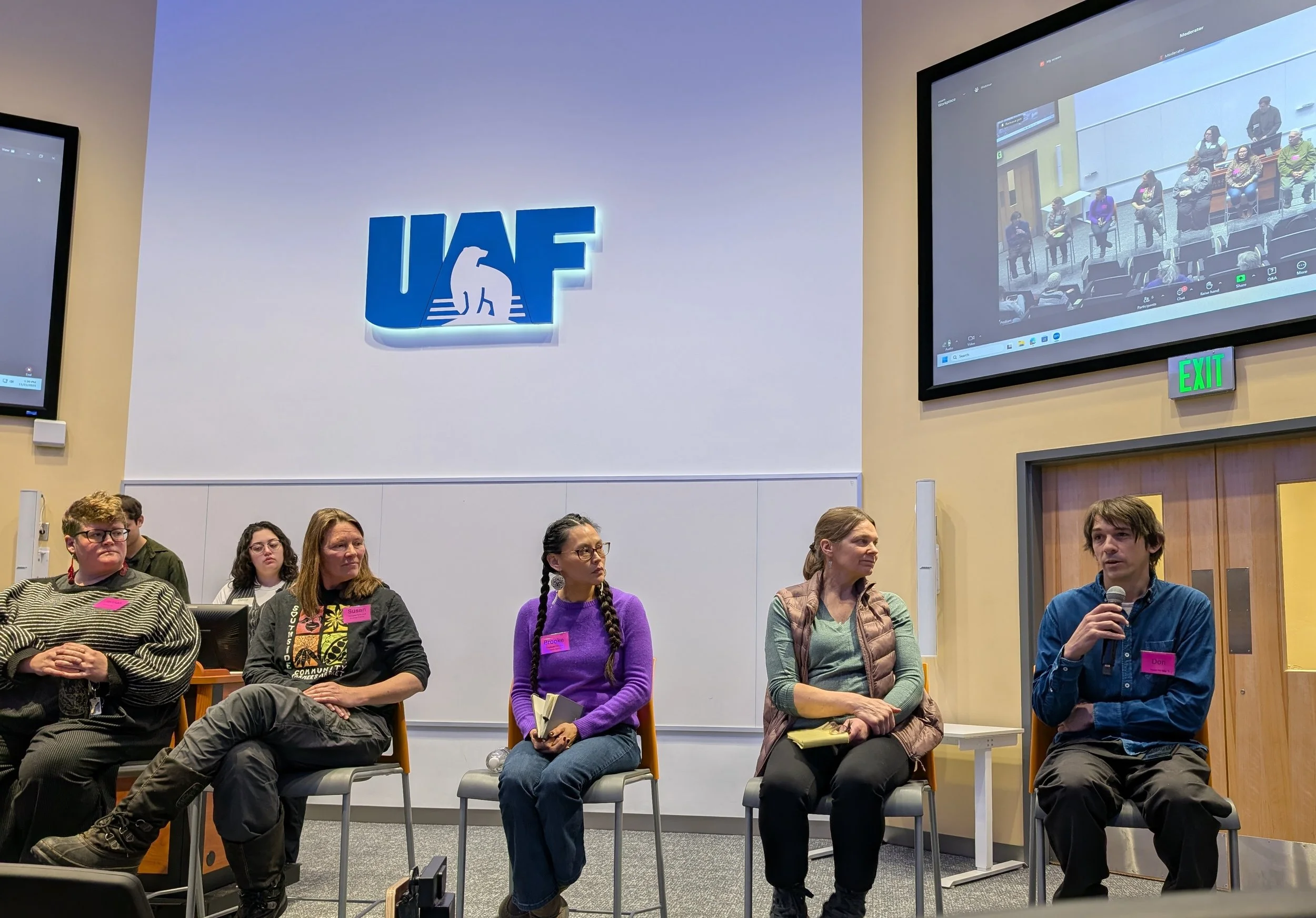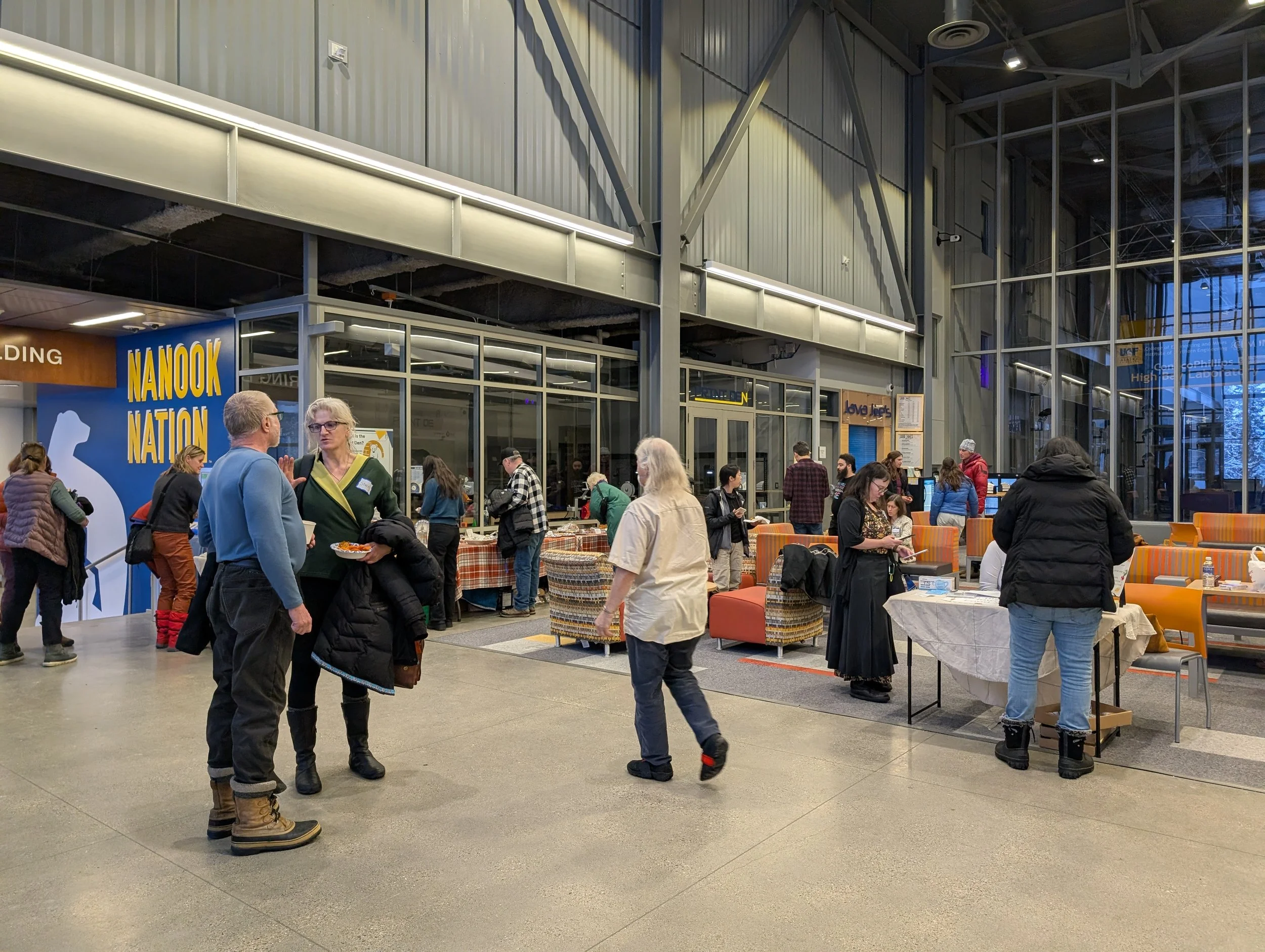Town hall calls for stronger food security as SNAP delays strain Alaska
Story and photos by Amber McCain
Panelists, including Indigenous leaders, farmers, food advocates, and more join together to discuss food security at the People’s Town Hall held in Schaible Auditorium at UAF on Nov. 22, 2025.
Community members, farmers, and Indigenous food advocates gathered Nov. 22 at the University of Alaska Fairbanks for a town hall on food security as the state’s Supplemental Nutrition Assistance Program, SNAP, funding becomes increasingly uncertain and local food systems face growing pressures.
Organized by Concerned Residents of Interior Alaska and co-sponsored by UAF’s Office of Sustainability, Resource Management Society, and the Alaska Farmers Market Association, the town hall featured a panel followed by breakout sessions focused on strengthening Fairbanks’ culturally rooted food systems.
Panelists framed food security broadly, encompassing not only access to food but also land, water, and the cultural practices needed to sustain traditional diets.
“No one came to save us, but our salmon did,” Brooke Woods recalled. Raised in the Yukon River community, Woods spoke about salmon’s central role and the ongoing challenges faced by rural communities.
“Many villages don’t have basic food programs, like school meals, and salmon used to provide 90% of our community’s daily protein.”
Woods emphasized a community responsibility in helping to bridge that gap in food access, saying that “sharing school lunches, making extras” is a great way to help if you can.
“Living in relationship to the land … for us, food security has changed,” Eva Dawn Burk, a Nenana tribe Indigenous leader, spoke on the spiritual and emotional dimensions of food.
“We need to get involved in more than just growing food,” Burk said. “It’s about healing, and indigenizing these spaces. Our youth are hungry.”
Don Carroll, a local food recovery and waste-reduction advocate and owner of Waste Me Naught LLC, speaks during the People’s Town Hall on Food Security at University of Alaska Fairbanks, on Nov. 22, 2025.
Burk encouraged people to attend Alaska Department of Fish & Game advisory meetings, with the reminder that decisions made in hubs have direct effect on rural fisheries and hunting.
Charles Brower, a local farmer, called for reform of hunting laws, arguing that migration-based harvesting calendars should align with subsistence users’ needs.
“Restrictive regulations undermine the ability of Indigenous and rural Alaskans to provide for their families,” Brower said.
Fairbanks’ role in the statewide food system was another topic of discussion as Brad St. Pierre, a Fairbanks farmer with Goosefoot Farm and executive director of the Tanana Valley Farmers Market, talked about how the city of Fairbanks has the resources and connections to lead a food system built on self-sufficiency.
St. Pierre discussed the benefits of expanding shared kitchens for food preservation, like canning, preserving and dehydrating. He also spoke in favor of federal legislation like Senate Bill 2338, the Strengthening Local Food Security Act of 2025, a bill that has been introduced and referred to the Senate Agricultural Committee but has not yet been voted on. Senate Bill 2338 would pay farmers who donate to those in need. St. Pierre also discusses the importance of sustaining SNAP/WIC match programs at farmers markets before funding lapses.
Don Carroll, owner of Waste Me Naught LLC, stressed reducing food waste and preserving traditional foods. When Hannah Hill, executive director of Breadline, spoke she highlighted the importance of community generosity. “Together means everybody. There is no end goal to community. Our responsibility to each other is forever,” Hill said.
Lorinda Lhotka, a food safety regulatory expert for retail, food processing, and Alaska’s homemade food exemptions, encouraged collaboration between producers and regulators. Susan Willsrud, founder of Goods of Farm and Ecology Center, emphasized supporting farmers and local markets as a key pillar of resilience.
Panelists offered a roadmap for action: low-hanging fruit such as shopping locally, hosting potlucks, and sharing seeds; short-term goals like maintaining SNAP match programs and expanding community gardens; and long-term visions including farmland protection, and feeding all Alaska schoolchildren with state-grown food.
Community organizations and local food groups host informational booths at the People’s Town Hall on Food Security at UAF.
“These are not just meals, it’s our health, our culture, our future,” Hill added.
Alaskans are facing a larger SNAP funding challenge. Roughly 66,000 residents, or about one in 10 Alaskans, depend on SNAP. Seven out of 10 SNAP recipients are children.
Because of federal delays, the state stepped in, using its own funds to reload EBT cards and support local food banks. Governor Mike Dunleavy declared a state disaster, allowing emergency spending while federal payments were paused.
Although $5 million per week was set aside by the state for emergency SNAP benefits during a federal shutdown, the funds were not immediately deployed as the state adjusted systems to distribute benefits solely with state money.
Meanwhile, other states are tightening SNAP eligibility. In Alabama, residents must now reapply, eliminating a previous automatic enrollment option.
After the panel, the crowd broke into smaller groups focused on subsistence and land use, food accessibility, small-scale growing, preservation, and food waste. Facilitators encouraged the crowd to join programs, learn about mutual aid opportunities, and participate in ongoing food-policy advocacy.




